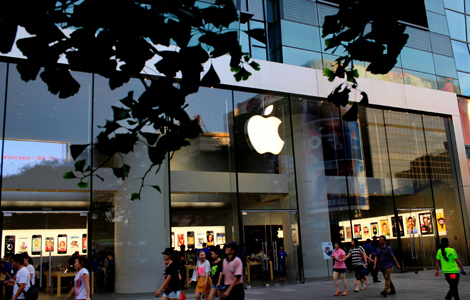

Shoppers shift focus to cheaper smartphones
Chinese consumers may be having second thoughts about buying Apple Inc's iPhone.
The devices are becoming so common in China these days that many people lost their once strong desire to own one. Also, iPhones are considered too expensive, and many consumers are opting for cheaper phones with similar capabilities.
 |
|
Apple said on Tuesday that its revenue from China fell 14 percent year-on-year to $4.6 billion in the quarter ended June 29.Provided to China Daily |
And the Chinese market's hesitation has showed in Apple's latest quarterly financial report. Even though the California-based company delivered better-than-expected global iPhone shipments of 31.2 million units during the quarter ended June 29, its performance in Greater China, including Hong Kong and Taiwan, was sluggish in the period.
Apple said on Tuesday that its revenue from China fell 14 percent year-on-year to $4.6 billion in the quarter ended June 29. The figure, which represents a 43 percent decline from the previous quarter, marked the first time that revenue decreased in the region.
Overall, Apple's quarterly global revenue remained flat at $35.3 billion.
Apple said its growth in the Chinese market had slowed, particularly due to economic headwinds. China's GDP growth eased to 7.6 percent in the first half, compared with 7.8 percent a year earlier.
Apple's chief executive officer Tim Cook said that he wasn't discouraged by the numbers from just one 90-day period.
"I continue to believe that in the arc of time here, China is a huge opportunity for Apple," Cook said on an earnings call on Tuesday.
However, analysts believe that fiercer competition, together with other factors, played a much bigger role in Apple's lackluster performance in China than the macro-economic effects.
"The iPhone 5 was less popular than its predecessor, the iPhone 4S, in China during the first 100 days after they hit the market," said James Yan, an analyst with research firm IDC. IPhone 5 handsets also saw stronger competition from brands such as Samsung Electronics Co Ltd and HTC Corp, as well as some local brands like Huawei Technologies Co Ltd and Xiaomi Corp, Yan said.
Meanwhile, Chinese telecom operators have cut their subsidies for iPhone 5 devices.
"Consumers and industry partners adopted a wait-and-see attitude toward the iPhone 5," Yan said. On the consumer side, they started to look for other high-quality smartphones with lower prices, or they are planning to buy the upcoming iPhone 5S or the iPhone 6, which seem to be more innovative products, he added.
Kevin Wang, an analyst with IHS iSuppli, said that Apple's pricing strategy also discouraged some first-time smartphone buyers and low-end customers. A 16 GB iPhone 5 costs at least 5,000 yuan ($809.80), more than the average monthly salary of people working in Beijing.
"The situation will only change when Apple introduces a less-expensive version of the iPhone, then we'll see a new sales surge in the country," Wang said.
For instance, Chinese telecom equipment maker Huawei, which in recent years expanded to the smartphone market, launched its P6 model in June, targeting high-end users but selling at a mere 2,688 yuan.
Huawei said on Wednesday that its first-half revenue was 113.8 billion yuan, up 10.8 percent year-on-year.
Meanwhile, the Beijing-based Xiaomi is selling high-quality smartphones at extremely low prices, usually below 2,000 yuan. Xiaomi said it sold more than 7 million smartphones in the first half.
But Apple still has ways to protect its status as a major player in China, said Xiang Ligang, a telecom industry insider.
Xiang said that Apple will likely quicken the pace of its collaboration talks with China Mobile Ltd, the nation's biggest telecom operator, to boost iPhone sales.
China Mobile and Apple have been in talks for years, but the two have yet to reach an agreement. Some industry sources said that the two companies will likely start cooperating soon, since all the preliminary work is done.